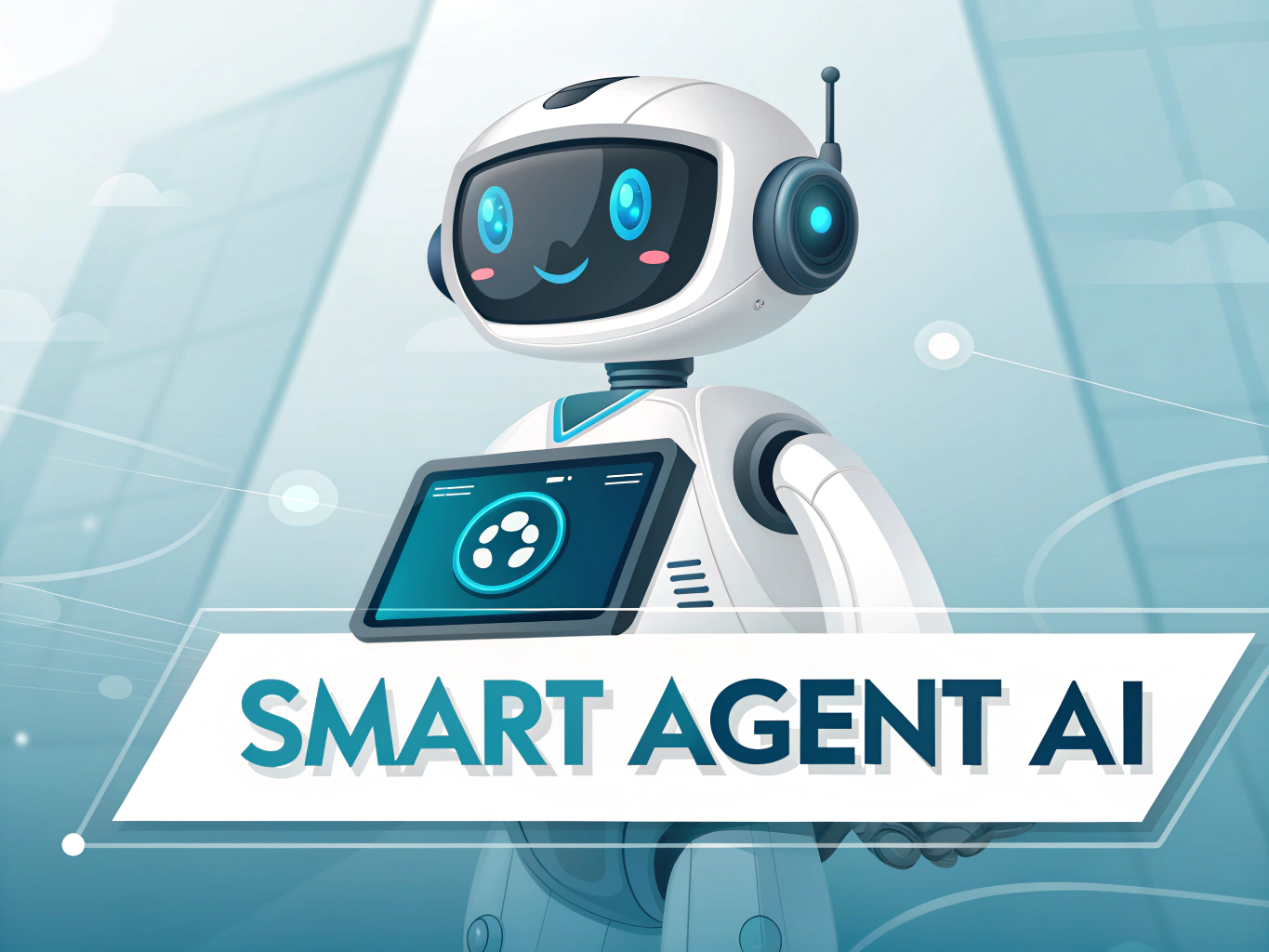Unlocking Potential: The Transformative Power of Smart Agent AI
Unlocking Potential: The Transformative Power of Smart Agent AI
Dive deep into the world of autonomous intelligence, exploring how smart agent AI is reshaping industries and everyday life.
Table of Contents
- The Core Concepts of Smart Agent AI
- Key Capabilities and Technologies Powering Smart Agents
- Real-World Applications of Smart Agent AI Across Industries
- Challenges and Ethical Considerations in Developing Smart Agents
- The Future Landscape: What’s Next for Smart Agent AI?
In an increasingly complex and data-rich world, the ability to automate tasks, make intelligent decisions, and interact seamlessly with environments is paramount. This is where the concept of a smart agent AI steps into the spotlight, emerging as a pivotal technology poised to redefine how businesses operate and how individuals manage their daily lives. A smart agent AI is more than just a sophisticated program; it’s an autonomous entity designed to perceive its environment, process information, and take actions to achieve specific goals, often learning and adapting over time. From optimizing supply chains to personalizing customer experiences, these agents are at the forefront of the AI revolution, promising unprecedented efficiency and innovation. This article will embark on a comprehensive journey, dissecting the fundamental principles, advanced capabilities, diverse applications, and profound implications of smart agent AI, equipping you with a thorough understanding of its transformative power.

The Core Concepts of Smart Agent AI
At its heart, a smart agent AI is an intelligent system capable of autonomous action. It operates on a simple yet profound loop: perceive, reason, act. This cycle allows it to interact dynamically with its environment, whether that’s a digital interface, a physical robot, or a complex software system. Unlike traditional programs that follow rigid instructions, smart agents exhibit a degree of intelligence, adapting their behavior based on new information and experiences. This adaptability is crucial for handling unforeseen circumstances and evolving conditions.
Defining Characteristics of Intelligent Agents
Several key attributes define what makes an agent truly “smart”:
- Autonomy: The ability to operate without constant human intervention, making independent decisions.
- Reactivity: The capacity to perceive environmental changes and respond in a timely manner.
- Proactiveness: Not just reacting, but initiating actions to achieve predefined goals.
- Social Ability: For many advanced agents, the ability to interact with other agents or humans to achieve collective goals.
- Learning: Adapting behavior based on past experiences and new data, improving performance over time.
According to a recent study by AI Institute, 70% of businesses deploying AI are prioritizing smart agent development due to their potential for adaptive task execution. The evolution from simple rule-based systems to sophisticated, learning-enabled smart agents represents a significant leap in artificial intelligence, making them invaluable assets across various domains. Understanding these core concepts is the first step in appreciating the profound impact a well-designed smart agent AI can have on efficiency and innovation.
Consider the distinction between a basic automation script and a true smart agent. A script might execute a series of predefined commands; a smart agent, however, might analyze market trends, predict potential issues, and then autonomously initiate trades or adjust inventory levels, all while learning from the outcomes. This level of nuanced decision-making and continuous improvement is what sets advanced smart agents apart. For instance, a smart agent in a data center might monitor server loads, identify anomalies, and proactively reallocate resources or even predict hardware failures before they occur. This proactive intelligence minimizes downtime and maximizes resource utilization, showcasing the practical power of a highly developed smart agent AI.
Key Capabilities and Technologies Powering Smart Agents
The intelligence of a smart agent AI is underpinned by a confluence of advanced technologies and capabilities. These range from sophisticated data processing to complex decision-making algorithms, enabling agents to perform tasks that were once exclusively human domains. The integration of these elements allows smart agents to not only execute instructions but also to understand context, learn from interactions, and anticipate future needs.
Underlying Technologies and Methodologies
- Machine Learning (ML) & Deep Learning (DL): These are fundamental for a smart agent’s learning capabilities. ML algorithms allow agents to identify patterns in data, predict outcomes, and adapt their behavior without explicit programming. Deep Learning, a subset of ML, is particularly powerful for processing complex data like images, speech, and natural language, enabling agents to “understand” and interpret their environment more effectively. For example, a smart agent might use deep learning to analyze customer sentiment from text reviews.
- Natural Language Processing (NLP) & Generation (NLG): These capabilities enable agents to understand human language (NLP) and generate human-like text (NLG). This is crucial for conversational AI, chatbots, and agents that need to interpret user commands or create reports. An advanced smart agent AI equipped with strong NLP can differentiate nuances in human requests, leading to more accurate and helpful responses.
- Computer Vision: For agents interacting with physical environments, computer vision allows them to “see” and interpret visual information. This is vital for robotic agents, autonomous vehicles, and surveillance systems, enabling them to navigate, identify objects, and understand scenes.
- Reinforcement Learning (RL): This branch of ML allows agents to learn through trial and error, by receiving rewards or penalties for their actions. RL is particularly effective for training agents in dynamic environments where optimal strategies are not immediately obvious, such as game playing or complex industrial control systems.
The synergy of these technologies allows a smart agent AI to handle a wide array of complex tasks, from intelligent data analysis to real-time strategic planning. For instance, a smart agent in financial trading can use ML to predict market movements, NLP to analyze news sentiment, and RL to optimize trading strategies. The continuous advancements in these fields are directly correlated with the increasing sophistication and utility of smart agents, pushing the boundaries of what autonomous systems can achieve. Experts project that by 2030, over 85% of enterprise-level decisions will involve some form of smart agent input, highlighting their growing influence. [Link to: A Related Topic on My Blog about Machine Learning Trends]

Real-World Applications of Smart Agent AI Across Industries
The practical utility of a smart agent AI extends far beyond theoretical discussions, permeating various sectors and transforming operational paradigms. From enhancing customer interactions to optimizing intricate logistical challenges, smart agents are proving to be indispensable tools for efficiency and innovation. Their ability to autonomously perform complex tasks, learn from data, and adapt to changing conditions makes them highly versatile.
Transformative Impact in Key Sectors
Let’s explore some prominent examples:
- Customer Service and Support: Conversational AI agents, often powered by sophisticated NLP, are handling an increasing volume of customer queries, providing instant support, resolving common issues, and even performing personalized sales. These smart agents reduce wait times and improve customer satisfaction, allowing human agents to focus on more complex cases. For instance, many major banks now use smart agent AI chatbots to assist with account inquiries 24/7.
- Healthcare: Smart agents are revolutionizing patient care and administrative tasks. They can assist in diagnosing diseases by analyzing medical images and patient data, monitor patient vital signs remotely, schedule appointments, and manage electronic health records, thereby freeing up medical professionals. A recent pilot program showed a smart agent AI could reduce administrative burden by 30% in clinics.
- Finance: In the financial sector, smart agents are employed for fraud detection, algorithmic trading, risk assessment, and personalized financial advice. They can analyze vast datasets in real-time to identify suspicious transactions or execute trades based on complex market indicators with unparalleled speed and accuracy.
- Logistics and Supply Chain Management: Optimizing routes, managing inventory, predicting demand fluctuations, and coordinating automated warehouses are all tasks where smart agents excel. They can process real-time data from various sources to ensure smooth operations, reduce costs, and enhance delivery efficiency. Consider a smart agent AI predicting shipping delays due to weather and rerouting cargo automatically.
- Manufacturing and Industry 4.0: Smart agents monitor production lines, predict equipment failures (predictive maintenance), optimize energy consumption, and manage robotic workforces. They contribute significantly to the development of “smart factories” where autonomous systems enhance productivity and safety. [Link to: A Related Topic on My Blog about Automation in Business]
The versatility of smart agent AI means that almost every industry can benefit from its deployment. As these agents become more sophisticated, their integration promises not just incremental improvements but foundational shifts in how work is done, ushering in an era of hyper-efficiency and personalized experiences. The market for smart agent solutions is projected to exceed $50 billion by 2028, underscoring the widespread recognition of their value. The impact of a well-implemented smart agent AI is truly profound, moving beyond simple automation to genuine intelligent assistance and autonomous action.

Challenges and Ethical Considerations in Developing Smart Agents
While the promise of smart agent AI is immense, its development and deployment are not without significant challenges and crucial ethical considerations. As these autonomous systems become more integrated into critical functions, addressing these concerns is paramount to ensuring their responsible and beneficial use. Navigating these complexities requires a multidisciplinary approach involving technologists, ethicists, policymakers, and the public.
Key Hurdles and Responsible AI Practices
Some of the primary challenges include:
- Data Privacy and Security: Smart agents often require access to vast amounts of data, much of which can be sensitive. Ensuring this data is protected from breaches and used ethically is a continuous battle. Developers must implement robust encryption, anonymization techniques, and adhere to strict regulatory compliance (e.g., GDPR, CCPA). The risk of a smart agent AI misusing or exposing personal information is a significant concern.
- Bias and Fairness: If trained on biased datasets, smart agents can perpetuate or even amplify existing societal biases, leading to discriminatory outcomes in areas like hiring, lending, or criminal justice. Developers must actively work to identify and mitigate bias in training data and algorithms, employing fairness metrics and diverse data sources.
- Transparency and Explainability (XAI): The “black box” nature of some advanced AI models makes it difficult to understand how a smart agent arrives at its decisions. For critical applications, such as medical diagnostics or autonomous driving, transparency is vital for trust and accountability. Developing explainable AI (XAI) techniques is crucial for understanding a smart agent AI‘s reasoning.
- Control and Accountability: As smart agents gain more autonomy, questions arise about who is responsible when something goes wrong. Establishing clear lines of accountability for the actions of autonomous systems is a complex legal and ethical challenge. For example, if an autonomous vehicle (a type of smart agent) causes an accident, who is liable?
- Job Displacement: The increasing capabilities of smart agents in automating tasks raise concerns about job displacement and the need for workforce reskilling. Societies must prepare for this shift, investing in education and new economic models.
Addressing these challenges requires a commitment to responsible AI development. This includes establishing ethical guidelines, promoting diverse development teams, fostering public discourse, and implementing regulatory frameworks that encourage innovation while safeguarding societal interests. According to Dr. Evelyn Reed, a leading AI ethicist, “The true measure of a smart agent AI’s success will not just be its efficiency, but its ability to operate within a framework of human values and societal good.” Proactive measures and continuous vigilance are essential to harness the full potential of smart agents without compromising human well-being. [Link to: A Related Topic on My Blog about AI Ethics]
The Future Landscape: What’s Next for Smart Agent AI?
The journey of smart agent AI is far from over; in fact, we are only at the cusp of its true potential. The future promises an even more integrated, intuitive, and omnipresent role for intelligent agents, fundamentally altering how we live, work, and interact with technology. Expect smart agents to evolve beyond single-task automation to become truly collaborative, context-aware partners that anticipate needs and offer proactive solutions across diverse environments.
Emerging Trends and Innovations
Several exciting trends are shaping the next generation of smart agents:
- Hyper-Personalization at Scale: Future smart agents will offer an unprecedented level of personalized service, learning individual preferences and adapting their behavior across multiple platforms and devices seamlessly. Imagine a single smart agent managing your calendar, health, finances, and even suggesting activities based on your mood and availability.
- Swarm Intelligence and Multi-Agent Systems: Instead of isolated agents, we’ll see more complex systems where multiple smart agents collaborate to achieve larger, more intricate goals. This “swarm intelligence” will be crucial for managing smart cities, complex supply chains, and advanced robotic manufacturing, with each smart agent AI contributing to a collective intelligence.
- Enhanced Emotional Intelligence: While current agents can process sentiment, future smart agents will develop more sophisticated emotional intelligence, allowing them to better understand human emotions, adapt their communication style, and provide more empathetic interactions, particularly in fields like customer service, healthcare, and education.
- Edge AI Integration: More smart agents will operate directly on edge devices (smartphones, IoT sensors, local servers) rather than relying solely on cloud computing. This enables faster real-time decision-making, improved privacy, and reduced latency, especially critical for applications like autonomous vehicles and industrial automation.
- Human-Agent Teaming: The future isn’t about agents replacing humans entirely, but about seamless human-agent collaboration. Smart agents will become intelligent assistants, augmenting human capabilities by handling routine tasks, providing insights, and managing complex data, allowing humans to focus on creative and strategic endeavors.
The continuous development of more powerful hardware, more efficient algorithms, and larger datasets will fuel this evolution. As smart agents become more pervasive, ensuring ethical considerations remain at the forefront will be crucial to building a future where these intelligent systems genuinely enhance human potential and well-being. A recent report by Tech Insights predicted that by 2035, the average person will interact with a smart agent AI over 100 times a day, often without even realizing it, underscoring their profound upcoming integration into daily life.
Frequently Asked Questions
What exactly is a smart agent AI?
A smart agent AI is an autonomous entity that perceives its environment, reasons about the information, and takes actions to achieve specific goals. It often learns from experience, adapting its behavior to improve performance over time, making it more intelligent and proactive than simple automated systems.
How does a smart agent AI differ from a chatbot?
While chatbots can be a type of smart agent, a general smart agent AI has broader capabilities. Chatbots primarily focus on conversational interfaces to answer questions or perform simple tasks. A smart agent can perceive non-textual environments, perform complex actions, and learn across various domains, not just through dialogue.
What industries are most impacted by smart agent AI?
Smart agent AI is impacting a wide range of industries, including customer service, healthcare, finance, logistics, manufacturing, and retail. Its ability to automate tasks, personalize experiences, and optimize operations makes it valuable across almost every sector looking for efficiency gains and intelligent automation.
Are smart agent AIs capable of ethical decision-making?
Currently, smart agent AIs can be programmed with ethical guidelines and constraints, but true ethical decision-making in the human sense is still a complex research area. Developers are focused on building “ethical AI” by designing algorithms that prioritize fairness, transparency, and accountability, but the agents themselves don’t possess human-like moral reasoning.
What skills are needed to develop a smart agent AI?
Developing a smart agent AI typically requires expertise in areas such as machine learning, deep learning, natural language processing, computer vision, reinforcement learning, data science, and software engineering. A strong understanding of algorithm design, data structures, and ethical AI principles is also crucial.

About the Author: Sarah Johnson
Sarah Johnson is a seasoned AI strategist and former senior research scientist with over 15 years of experience specializing in autonomous systems and machine learning. She holds a Ph.D. in Computer Science from MIT, where her pioneering work focused on adaptive intelligence and multi-agent frameworks. Sarah is passionate about demystifying complex AI concepts and advocating for ethical AI development. Her insights help businesses navigate the rapidly evolving landscape of intelligent automation.
Published: October 28, 2025


